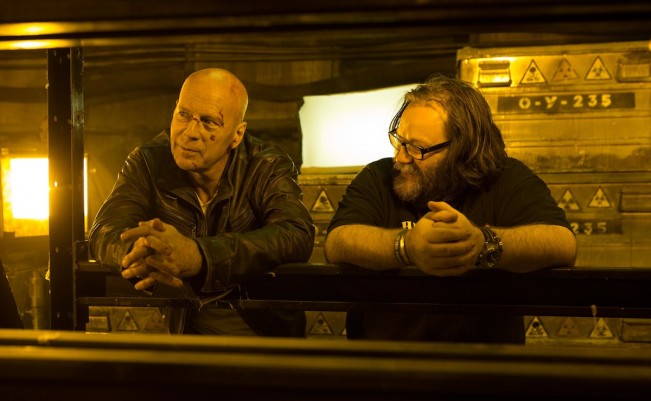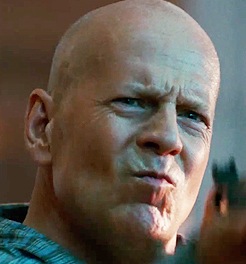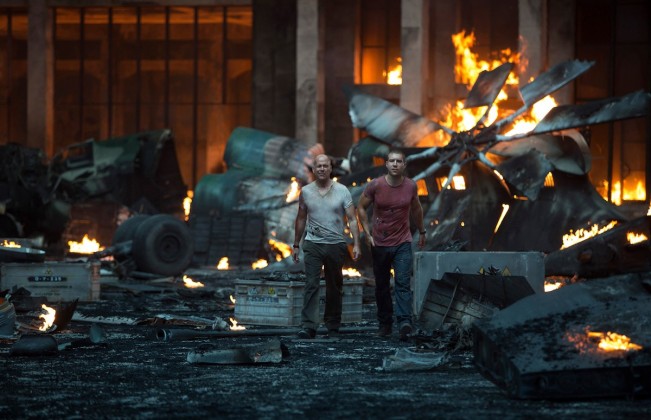

By Mike Wilmington Wilmington@moviecitynews.com
Wilmington on Movies: A Good Day to Die Hard
A GOOD DAY TO DIE HARD (Two Stars)
U.S.: John Moore, 2013
A Good Day to Die Hard is the fifth of the Bruce Willis Die Hard movies — and it’s obviously, irretrievably, die-hardishly one too many.
It’s not that the franchise has worn out its welcome (though many critics seem to think so), or that Willis, (in his signature role of tough, hard-bitten, never say die NYPD cop John McClane) has worn out his. Nor is Willis’ age (57) any impediment to our enjoyment, or at least to mine. (I was more put off by the relative youngster, Jai Courtney of the recent Spartacus, whom they brought in to play McClane’s long-estranged son.) But this movie — its script, its ideas, its characters and its over-packed, over-violent, under-thought action sequences — exhausts us pretty fast.
It’s a stinker. It’s no exaggeration to say (as many have) that A Good Day to Die Hard is the worst of the McClane pictures, the one that should have died quick, and disappeared.
What can you say? Time passes. Bruce Willis got old. Arnold got old. Sylvester Stallone got old. Hell, we all get old and let me tell you, it’s no damned fun — not even if you’re one of those movie guys above and you spend your work-days beating up movie bad guys, surviving movie gunfights and dodging movie explosions, at millions of dollars a pop. And not even if you have expert movie stuntmen to do a lot of your surviving for you, plus blanks in the guns and CGI to fake the pyrotechnics. I guess, as long as there’s a Republican Party — the parsimonious political franchise for which these action guys probably usually vote (and sometimes serve as a governor) — old age will be a living hell for a lot of us. At least if you’re not a millionaire or a billionaire, or a congressperson.
 So we recently got Old Arnold in The Last Stand, and Old Sly in The Expendables and Bullet in the Head — and now we get Sort of Old Bruce Willis in a spy saga piece of recycled mayhem, insanely overblown action and drecky scriptwriting disguised as a Die Hard movie. Now, the earlier shows in that series were entertaining and exciting. The 1988 Die Hard is one of the top 80s action movies — one picture that blasts you out of your seat and still keeps you interested in the people doing the blasting. Especially McClane.
So we recently got Old Arnold in The Last Stand, and Old Sly in The Expendables and Bullet in the Head — and now we get Sort of Old Bruce Willis in a spy saga piece of recycled mayhem, insanely overblown action and drecky scriptwriting disguised as a Die Hard movie. Now, the earlier shows in that series were entertaining and exciting. The 1988 Die Hard is one of the top 80s action movies — one picture that blasts you out of your seat and still keeps you interested in the people doing the blasting. Especially McClane.
This new movie though is just ridiculous. We get McClane, and McClane’s son Jack — the younger McClane absent from the series till now, though he has risen though the C. I. A. far enough to be entrusted with the fate of the world. The two are up against the Russian government and the police and massive firepower and assorted crooks and a billionaire Russian dissident scientist (Yuri Komarov, played by that fine actor Sebastian Koch of The Lives of Others) whom they’re trying to spirit out of the country, all by themselves.
Some of the reasons the original Die Hard worked so well is that there was a story of some interest in between the action scenes, a great location in those huge towers (or some mockup of them) and antagonism of some snap between Willis‘s working class New Jersey cop McClane and Alan Rickman as the snobby terrorist. A Good Day to Die Hard has a superficially more complex international intrigue plot going, but, as usual with lots of today‘s action movies, it has empty characters, spritless dialogue and(here we go again) it makes no f–king sense.
Except in box-office formula terms. In the movie, because it’s necessary to bring on a younger co-hero to satisfy the demographics youth-obsessed marketing gang, McClane has been supplied with this two-fisted C. I. A. son, appearing out of nowhere, unknown to any of us before through four movies, and apparently incommunicado with his dad for decades. But McClane has been recently afflicted with fatherly twinges (at a shooting range, yet) and he decides to visit son Jack (Jai Courtney) who’s been imprisoned in Russia.
By an amazing coincidence, the first of many, John shows up at the courtroom at just about the time that C. I. A Jack is escaping with the renegade billionaire Komarov. And he tags along as the bunch flees along the Moscow highway, crashing and banging and trading fire — but arousing no reaction we can see among the drivers of all those endangered vehicles, even during full collision. Nor do any Moscow traffic control representatives express any interest in what’s going on so destructively on their world-famous highway, on the Garden Ring. (Many of the exteriors, by the way, were shot in Hungary.)
At that moment, in that chase, with the older McClane bouncing blithely off the car roofs, the movie lost me, never to return — though only five or six good wisecracks from Willis (or somebody) might have been enough to bring me back aboard. But director John Moore (who made Behind Enemy Lines and the remakes of The Flight of the Phoenix and The Omen) and writer Skip Woods (who wrote The A-Team and Swordfish) don’t seem to have wisecracks or humor of any kind in their bags of tricks this time — though actually, that seems to subvert the very wise-crackling Yippee Ki-yay legacy of the previous Die Hards..
Meanwhile….Crash! Bang! Kerplunk! It probably takes a certain kind of reverse genius to make a movie like this, in which you have as many wildly expensive and over-several-tops action scenes as this one does, and still achieve disinterest, disbelief and occasionally stupefying boredom. On and on they come, defying traffic laws, defying world history nd current events, defying sanity, defying the very legacy of Die Hard.
. We get that massive chaseon the Garden Ring, involving a van, an MRAP military vehicle and that unimod driven by McClane. Later, we get the world’s biggest helicopter (called “Miss Belarus“) hovering and slicing humans during a showdown in the Chernobyl nuclear plant — not to mention John and Jack McClane hurling themselves out of a building down though a glass roof, and suffering no more than one of Willis‘ patented grimaces (which can be distinguished from his patented smirks only by the way the corners of his mouth tweak up or down).
We also get a variety of villains: mainly the perfidious Russian defense minister Chagarin (Sergei Koleshnikov), who apparently has no control of his country’s peace and order (at least when American movie companies are shooting car chase sequences), an effete criminal named Alik (Radivoje “Rasha” Bukvic) who seems to be working for Chagarin, plus a lot of shady, sometimes tattooed characters hanging around the abandoned Chernobyl plant. For women characters, we get McClane’s daughter Lucy (played by Elizabeth Winstead, who performed so brilliantly this year as an alcoholic teacher in Smashed, to an audience that was a tiny fraction of what this movie will get) and Komarov’s femme fatale of a daughter Irina (Yuliya Snigir), plus the lady driver who gets upset when Willis bounces off her car roof.
That’s one of the things that makes Good Day to Die Hard so hard to swallow: the lack of plausible people living, or doing or saying much, in this version of Russia. There are lots of names in the cast list but few characters you remember beyond the combatants. It’s as if the entire city of Moscow had been forsaken by everybody except the good guys, the bad guys and a lot of innocent bystanders, milling around, wondering when they get to say something. (As some have observed already: Given the quality of Woods’ dialogue, these bystanders may be lucky.)
There is one memorable character and I wish they’d done more with him: the Russian cabbie who drives McClane to the courtroom and who turns out to be a devotee of Frank Sinatra and “New York, New York,” which he sings, badly. It’s a stupid scene in a way, but the actor who plays the cabbie (Pashad Lychnikoff) does it with gusto. Had I been writing, or diddling with this script, I would have probably tried to promote Pashad to full-time supporting actor and had him volunteer to drive the McClanes all over Russia and to Chernobyl, where he could have sung (or hummed) “I’ve Got You Under My Skin.” (Just kidding, but not about Lychnikoff’s promotion.) Why? Well, it’s good to get a civilian or two in movies like this. (Even Rio Bravo has Pedro Gonzales-Gonzales.) Three-scenes sometimes work better than two-scenes, and the cabbie could have relieved the uncomfortable schmaltz of all the film’s father-son “Getting to know you” confabs.
By the way, I didn’t like the title either. “A Good Day to Die Hard” probably comes from that phrase (“Its a good day to die”) so memorably used (at least it was the first time I heard it), by Chief Dan George as Old Lodge Skins in Arthur Penn’s wonderful, too-neglected Western Little Big Man. But it seems pretentious and clumsy used here. And it lacks the pizzazz of the other four series titles: Die Hard, Die Hard 2 (a.k.a. Die Harder), Die Hard with a Vengeance, and Live Free or Die Hard.
Some replacements? Andrew O’Hehir had some nice ones in his Salon review: “Die Harderer,” “Die Hella Hard” and (my favorite) “Faster Pussycat! Die Hard!.” But let’s try….maybe harder. What about “Never Say Die Hard?” How’s about “Die Hard Like a Dog?“ What about (for Hal Ashby fans), “8 Million Ways to Die Hard?“ What about (for Tallulah Bankhead Fans), “Die! Hard! My Darling!” Or, for Psycho buffs “Strychnine: An Ugly Way to Die Hard.“ And what about “Die With a Hard On?” (Sorry.)
Aw, we’re all getting too damned old. You. Me. Bruce. Sly. Arnold. All of us. (Hey! What about “Die Hard Laughing“ Or “Die Laughing Hard?“)















